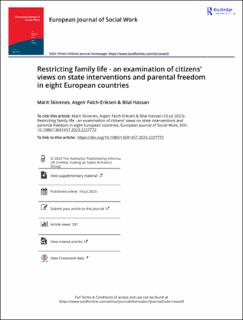Restricting family life - an examination of citizens’ views on state interventions and parental freedom in eight European countries
Journal article, Peer reviewed
Published version

Åpne
Permanent lenke
https://hdl.handle.net/11250/3109035Utgivelsesdato
2023Metadata
Vis full innførselSamlinger
- Department of Government [457]
- Registrations from Cristin [9791]
Sammendrag
This paper examines the public views – a total of 10,348 persons – on restrictions of personal autonomy of others to protect the interest of children. We use representative country samples of the adult populations of Austria, England, Estonia, Finland, Germany, Ireland, Norway, and Spain, and ask them to consider an experimental vignette with three different parental conditions: substance abuse, mental health problems, and learning difficulties. The findings display that most people would restrict parental freedom to protect the child, and a stricter restriction when the parent struggles with substance abuse compared to mental health compared to learning difficulties. There are some country differences, and when examining the role of institutional context of child protective system, a correlation is detected with significant differences between population views in a right-oriented system versus a well-being system and maltreatment system. In light of the ongoing European debates about child protection and how controversial and contested this area of the welfare state seem to be, it is interesting to learn (also) from this study that people, across countries, individual differences, child protection systems, overall are supportive of state intervention and support in a situation with a child at potential risk.
